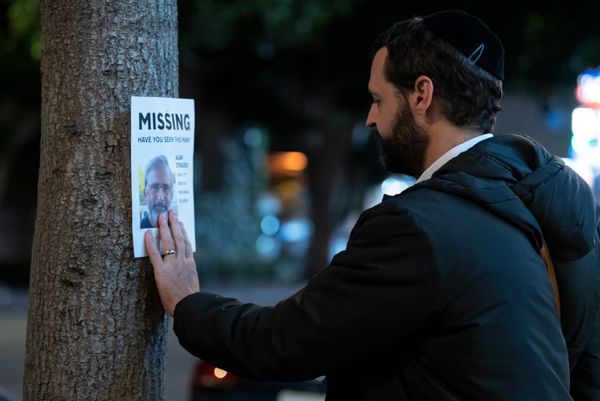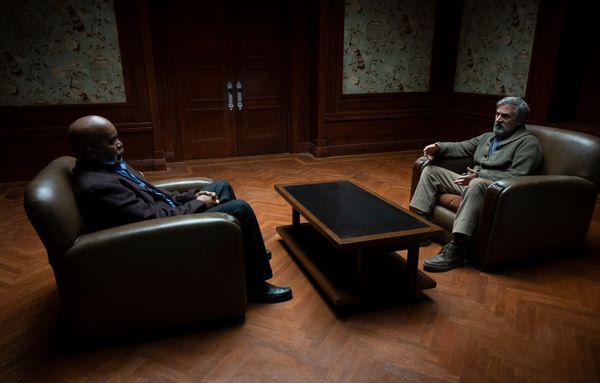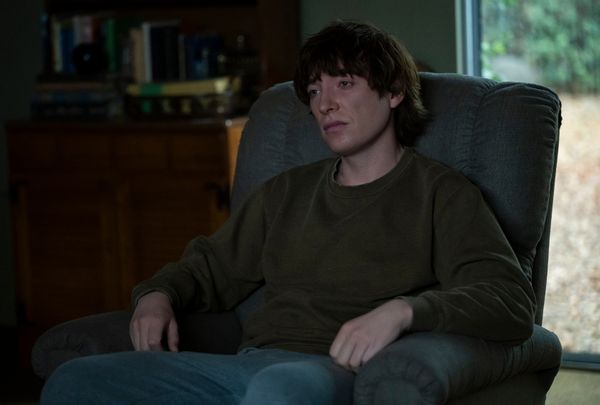
Halfway through "The Patient," Steve Carell's psychotherapist Alan Strauss transitions his mode of thinking from frantically figuring out how to stay alive to contemplating what gives his life meaning.
No doctorate is required to understand why that is. Alan spends most of this limited series shackled to a bed in the basement of a man named Sam (Domhnall Gleeson), a client who reveals he's a serial killer.
Sam imprisons Alan because he believes that having his therapist available to him exclusively, whenever he needs him, will be enough to prevent him from killing again. A certain turn of events removes any doubt as to whether that prescription ever had a prayer of being effective.
Once that line is crossed the original horror of Alan's kidnapping sharpens into focus once again, heightening the tension creators Joel Fields and Joe Weisberg, the duo colloquially known as "the Js," challenge themselves to sustain through the finale.
From the moment Sam kidnapped Alan, the psychologist's life was forfeit. But the co-creators, who wrote every episode, challenged themselves to keep open the possibility that Alan may somehow connect with Sam's humanity enough for the killer to be inspired to free him.
"From very early on almost the very beginning, we felt that [Alan] was not going to make it and that that was kind of inevitable conclusion of the story," Weisberg told Salon in a recent interview about the finale. "We're very devoted to feeling real, but also for emotional, thematic, and character reasons that felt right to us. But that's not to say that we didn't explore numerous ways of getting to that end."
"Joe and I talked a lot about our own experiences as Jews and our own experiences with antisemitism ...so that couldn't help but be baked in there."
A few of those avenues opened the series to criticism and debate. "The Patient" debuted at a time when antisemitism and violence directed at Jewish people is spiking. It must also be noted that our conversation took place before Kanye West's antisemitic posts got him locked out of Twitter and Instagram and is said to have inspired a disturbing demonstration by a hate group in Los Angeles.
None of that had anything to do with the direction that Fields and Weisberg adopted in shaping Alan's dominant perspective, a process that occurred long ago. "It's not that we were actively infusing it in there consciously, because we're just trying to tell a story," Fields explained. "But Joe and I talked a lot about our own experiences as Jews and our own experiences with antisemitism, and even with some of the rising antisemitism that we and those around us are experiencing. So that couldn't help but be baked in there."

Through Alan, Fields and Weisberg craft a story that marries the character's Jewish identity with themes of regret, grief, cultural memory and ultimately, the difference between surviving and living. And part of Alan's processing of his impending doom involved scenes from the Holocaust.
In the second to last episode, "Auschwitz," Alan retreats into an imaginary session with his deceased therapist Charlie (David Alan Grier), a recurring mental escape throughout the season along with memories of his estrangement with his son and his recently deceased wife Beth (Laura Niemi). Here, he dreams of encountering psychiatrist and Holocaust survivor Viktor Frankl in the notorious concentration camp, writhing in the throes of a nightmare.
Frankl, the author of "Man's Search for Meaning," appears in Alan's subconscious because of a quote he paraphrases that reality is worse than a nightmare when you're in Auschwitz. Alan's takeaway from this is, "Don't wake him up."
"Or," Alan tells his illusionary therapist, "maybe it's telling me, 'Don't die like a f**king sheep.'"

When asked about their decision to incorporate those scenes, Fields said, "It's funny, so much of that stuff springs from our unconscious minds, and then we try to spring it into what felt most true to what the character would be going through."
Taking this idea into Sam's basement, Alan is a captive of a murderer who struggles to see those who offend him as human, and he's aware that could and will include him. He's also facing the reality of his impending death, whether it comes soon or, if he were to go along with Sam's demented plan following a "breakthrough," years later.
"If you think about the show, and Alan's locked there in the basement, and Sam goes to work, and you think, 'Alan fantasizes about Auschwitz?' I 100% want to see that scene," said Weisberg. "And I don't even necessarily know why, although I suspect it's mostly because it feels true."
That may be why those scenes struck a nerve with some people, a discomfort that may be further amplified in the finale when Alan finally faces his fate and descends into a nightmare scene in a concentration camp. He awakens in a better dream, relatively speaking.
"The Nazis were human, and woe to all of us if . . . we think that we're somehow a different species."
Alan and Sam's tortured tale ends a 46-minute installment, the longest in a 10-episode drama that tells its harrowing story in chapters that for the most part clock in under 30 minutes apiece. The 21-minute premiere is the shortest entry, announcing the show's intention to be a taut exercise in tension-building.
But that's a simple summation of what this show endeavors to be. The internal struggles that Gleeson's Sam purports to endure fit the description of a serial killer drama – another coincidence, given the concurrent run of Netflix's highly dramatized limited series about Jeffrey Dahmer. That show became a hit for what many would consider the wrong reasons, in that it is accused of glamorizing its repugnant main subject.

Gleeson specified in an earlier interview that he took pains to refrain from treating Sam with such deference, a decision and performance the writers "are 100% in love with," said Weisberg.
"But for us," he continued, "we did want to humanize Sam. We did not want to glamorize him or make him appealing . . . but locating the humanity in the serial killer so that we do not have the comfort of pretending they're not human seemed interesting to us."
Fields concurred. "There is, I think, a connection to the Holocaust imagery there, in the sense that one could easily hear the rejoinder, 'Well, would you want to humanize a Nazi?' And to me, the answer is, well, yes. The Nazis were human. And woe to all of us if . . . we think that we're somehow a different species."
"Serial killers are also human," he added. "They're all aspects of who we are. And we have to sort our way through that if we're going to get to a better place together."
Later in our conversation, Weisberg makes a point of adding that the complex array of forces at work in American society is the reason they wrote a character whose Judaism and Jewish identity are so important to him.
The writers shared with reporters attending a Television Critics Association press conference held in August that Alan wasn't originally conceived as Jewish. But in their search for points of specificity, it became obvious that tapping into their lived experience was the best approach.
"We would not have done that five years ago," Weisberg admitted in the spirit of offering that good things are happening in the world right now, too. "Five, 10 years ago, it wouldn't have appeared to be on the palette of possibilities. Whether it was or not, we wouldn't have known it was. So I think that's something we feel pretty good about."
All episodes of "The Patient" are now streaming on Hulu.







